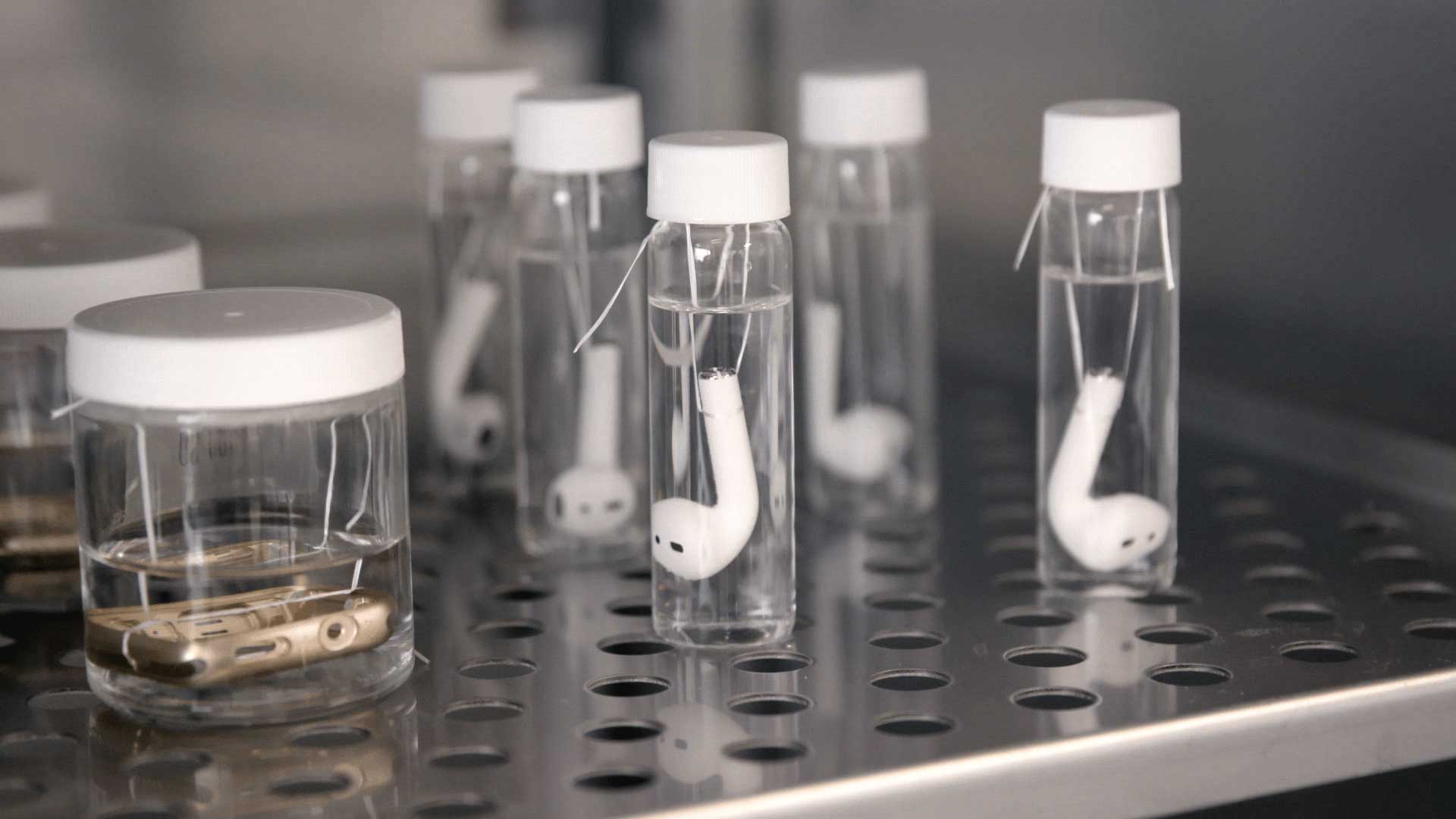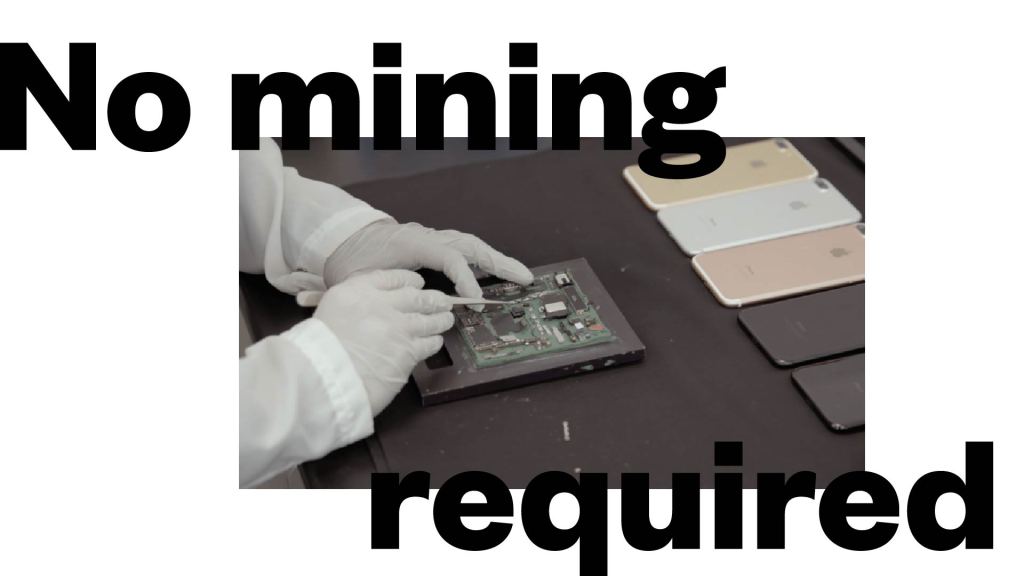Apple has one of the most aggressive sustainability and recycling programs in tech, but it still pulls plenty of metals and toxic rare-earth materials out of the ground to make iPhones, iPads, MacBooks, and other products.
That’s about to change. The company is set to announce a new, unprecedented goal for the tech industry to “stop mining the earth altogether.”
Videos by VICE
The announcement, part of Apple’s 2017 Environment Responsibility Report released Wednesday, will commit the company to making devices entirely from recycled materials such as aluminum, copper, tin, and tungsten. But there’s one hiccup: Apple doesn’t know exactly how it’s going to make that happen.
“We’re actually doing something we rarely do, which is announce a goal before we’ve completely figured out how to do it,” Lisa Jackson, Apple vp of Environment, Policy and Social Initiatives and a former head of the EPA, told VICE News during an exclusive visit to Apple’s environmental testing lab Monday. “So we’re a little nervous, but we also think it’s really important, because as a sector we believe it’s where technology should be going.”
In 2014, less than 16 percent of global e-waste was recycled, according to a United Nations University report. And Jackson conceded that only a small amount of what’s contained in an iPhone comes from recycled material. Eventually, Jackson said, the company will combine high-quality recycled metals bought from suppliers with those taken from old Apple products returned by customers. “We are committing as a company to not necessarily having to source from the earth for everything that we need,” Jackson said.
The 2017 report also outlines how Apple is doing on its other environmental goals. For instance, the company says its facilities now run on 96 percent renewable energy — up from 93 percent the year before. This number covers Apple’s stores, corporate offices, and data centers. It doesn’t include Apple’s many third-party manufacturers, however, but Apple says it’s making progress with them, too.
In total, seven of Apple’s major suppliers have pledged to produce Apple products using renewable energy alone by the end of next year (Apple declined to release its total number of suppliers). Jackson also pointed out that for the first time, Apple is protecting enough sustainably managed forests in the U.S. and in China to “cover all of packaging that we use in our products.”
Apple’s latest environmental achievements are notable, but they will likely be eclipsed by Apple’s new goal of giving up mining altogether. That’s because even though recycling phone components can have its own environmental impact, the kind of mining that Apple relies on is notorious for its labor abuses and the pollution it discharges into local waterways. For instance, a Washington Post report last year revealed that children had been seen working in cobalt mines in the Congo — and cobalt is an important component in the lithium batteries that companies like Apple and Samsung rely on. (Apple has since helped launch a Responsible Cobalt Initiative and it completed an audit of its supply chain.)

Meeting the goal could also reduce Apple’s reliance on minerals mined in conflict areas. Apple has been addressing the issue of conflict minerals by conducting third-party audits at its smelters, and that’s a source of pride for Jackson. But the company has yet to declare its products conflict-free. “I’d be lying if I didn’t say that one of the reasons that it appeals to us to use more recycled material is that it gives us a different potential answer to the question,” she told VICE News.
The reason to announce the goal publicly is to encourage innovation among suppliers and let them know that Apple wants to do business with them. “Who knows more about recovering metals than people who mine them?” Jackson said. “So some of the same smart people who do that, if they think there is a market for their services on the other side, might get involved.”
Apple’s pledge will no doubt have an impact, but if the battle surrounding a similar industry — coal mining — should teach us anything, it’s that redirecting miners toward more sustainable practices and jobs is hard to achieve without government backing. It would take a relatively small investment to retrain coal workers to work in renewables. But that’s clearly not the path forward for the Trump administration, which has chosen to focus on keeping coal workers in the coal industry. This general mindset means that even for a company like Apple, converting an industry from mining to recycling could be a challenge.
Jackson, who ran the EPA from 2009 to 2013, argues the jobs of the future will be centered around clean energy and the technological innovations therein. “I’ve always said it’s really fair to think about who wins or loses, and [to think about] how to give that transition time to be just and fair. But what doesn’t seem to work is pretending the transition’s not happening,” she said.
Compared with many other tech companies, Apple does seem to be putting in more effort to reduce its impact on the environment. “Other companies have commitments on using a certain amount of recycled plastic, but in terms of making everything 100 percent out of recycled materials, I’m not aware of a company that size that has made a similar commitment,” says Greenpeace Senior IT Analyst Gary Cook.
Still, Apple’s methods for reducing its carbon footprint remain distinctly “Apple-like.” Whether it’s congratulating a supplier for using floating solar panels or making a robot named Liam that can efficiently disassemble the iPhone 6S to recover parts for future recycling, Apple sees climate change as a problem that can be “solved” through new technologies. Because of this — and its obvious need for continued profits — Apple continues to reject the idea that the company could meet its environmental goals sooner if it made its products last longer, and gave its customers the ability to easily repair them on their own.
“They also have control over how the products are designed,” Greenpeace’s Cook says, “and should be made with an eye toward making products easier to repair so they have a longer lifespan.”

Jackson pushed back on the idea that Apple’s products could have a longer useful life. “I think a product that lasts is really important, and a lot of people buy Apple products because they know they do last,” she said during the interview. But research has shown that product lifespans in the electronics industry are dropping as a whole. And Apple itself models a product lifespan of three years for its phones — which, for a product that costs over $900, falls short of many people’s expectations.
Jackson also defended Apple’s history of making products that are hard to repair. Allowing customers to repair Apple products themselves “sounds like an easy thing to say,” she said. But “technology is really complex; it is sophisticated to make it work, to ensure that you have security and privacy, [and] that somebody isn’t giving you bad parts.”
Because of this, Apple won’t be taking a “right to repair” approach to meeting its environmental goals. “All those things mean that you want to have certified repairs,” Jackson said. “I think trying to pretend that we can sort of make it easy to repair the product, and that you get the product that you think you’re buying — that you want — isn’t the answer.”




